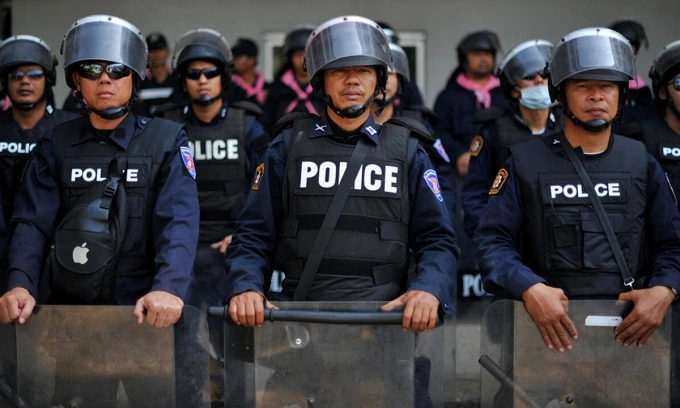The Prime Minister of Thailand, Anutin Charnvirakul, has taken the initiative to launch a campaign against the internet scams in Thailand in order to safeguard the people and the economy from the cyber frauds. This is the first step of the government’s hard line against tech crimes, the online scams already identified as the main problem where such protective measures would be beneficial. He declared it is a fight that the entire nation has to win.
The Thailand online scams crackdown has united fifteen government agencies, all signing a memorandum of understanding (MoU) to collaborate under a single national strategy. Prime Minister Anutin Charnvirakul addressed the rising issue of online fraud, warning that it is destroying lives, ruining families, and undermining public trust, the economy, and Thailand’s international image. He emphasized that the hidden effects of these crimes are difficult to measure.
The MoU establishes a unified framework for agencies to fight cybercrime, with dismantling scam networks that target Thai citizens as a top priority. The Prime Minister stressed that combating cybercriminals is a matter of national security and a key focus of his administration. He described the MoU as a practical plan rather than just a formality, representing a joint mission of all departments.
Under the agreement, Anutin outlined five major actions as part of the Thailand online scams crackdown initiative:
If police do not follow people, more will yield to crime.
He said nobody was ever charged in the last 10 years under a certain Act.
Assets will be quickly frozen and financial channels disrupted to prevent money laundering in Thailand.
Cutting-edge technology along with AI will be deployed to follow money flows and detect unlawful activities at an early stage.
Public awareness and support campaigns are being launched as part of the Thailand online scams crackdown to educate citizens, make them more alert, and encourage active participation in the fight against online fraud.
Prime Minister Anutin Charnvirakul also addressed critics who claimed authorities were hesitant in tackling cybercrime. He stated that the attendance of top officials at the function demonstrated unity and a no-tolerance stance against all technology-related crimes that threaten public safety.
Thailand Spy Chief Declares War on Scammers
Among the signatories of the MoU were the Anti-Money Laundering Office (AMLO), the Royal Thai Police, the Public Sector Anti-Corruption Commission, the Ministry of Digital Economy and Society, the Ministry of Justice, the Ministry of Interior, the Ministry of Finance, the Ministry of Foreign Affairs, the Bank of Thailand, the National Broadcasting and Telecommunications Commission (NBTC), the Securities and Exchange Commission (SEC), the Department of Special Investigation (DSI), the Thai Bankers’ Association, the Association of State Financial Institutions, and the Ministry of Commerce.
This coordinated effort under the Thailand online scams crackdown ensures that all agencies work together to dismantle fraud networks, monitor financial transactions, and protect citizens from online scams.
The ceremony was graced by Deputy Prime Minister and Finance Minister Ekniti Nitithanprapas, who stood next to Digital Economy and Society Minister Chaiyanok Chidchob, Justice Minister Rutthaphon Naowarat, national police chief Kittharath Punpetch, DSI chief Pol Maj Yuttahana Praedam, Bank of Thailand governor Vitai Ratanakorn, and other officials from partner institutions.
The police chief has promised that all measures will be taken to deal with scams.

Gen Kittharath Punpetch, the chief of police in Thailand, declared that the Thai police would keep on with their actions against scam groups no matter the outside accusations which picture them as corrupt.
He mentioned the latest accusations that labeled the RTP as a “criminal group” and expressed that the police department fully supports the government’s policy on scanning, treating digital fraud as a significant risk that leads to great economic and social devastation.
According to Kittharath, Thailand is not the main place where most of the scamming organizations are located since many of them are operating from the neighboring countries. Besides, he also mentioned that Thailand is collaborating with Interpol and the UN in the fight against the underworld of call centers, scams, and human trafficking, which are sometimes
He noted, nevertheless, that a handful of suspects from countries around Thailand were making efforts to seek the latter as their refuge to dodge the courts; however, the Thai authorities had been returning them to their respective countries.He elaborated that effectiveness of arresting these criminals was largely reliant on cooperation with those countries.
No police officer or civilian will be exempted from serious legal punishment if found guilty of any wrong conduct. Any crime that impacts the people will be treated as per the directives of the prime minister.
He admitted that law enforcement was subjected to extremely negative evaluations early on, and he called the allegations that the police were a big criminal syndicate a very unfair characterization of the police doing their job. He stated that he remains composed in the face of continuous assaults but nonetheless termed the indictment as a grave insult which no upright officer would be able to endure.
Emergency Decree to Combat “Grey Money”
Moreover, the Minister of Finance, Ekniti Nitithanprapas, was the one who disclosed that the government is about to issue an emergency decree to control “grey money” and demask the actual beneficiaries engaged in financial transactions. He put the Ministry of Digital Economy and Society in the process of drawing up the bill at the Standard Economic Forum 2025 event.
He stated that the pm considers the battle against unofficial capital as the number one priority. On the night of November 4, Anutin summoned him to an urgent meeting which lasted till 11:30 p.m. and gave him the order to advocate for an all-out war without discrimination.

Ekniti pointed out that Thai currency’s stability is in great demand for legit and illegit purposes, the latter even through the use of money laundering. So, the Kingdom has to cope with such contemporary methods.
In order to boost this project, Anutin established four subcommittees: one dedicated to blocking scam networks, the other one for technical measures, the third—Anutin himself as chair—was working on uniting financial data according to the “Connect the Dots” model and the fourth was in charge of communication with the public. He pointed out that Thailand’s anti-scam system should be on a par with or better than the international standards established by the Financial Action Task Force (FATF).





